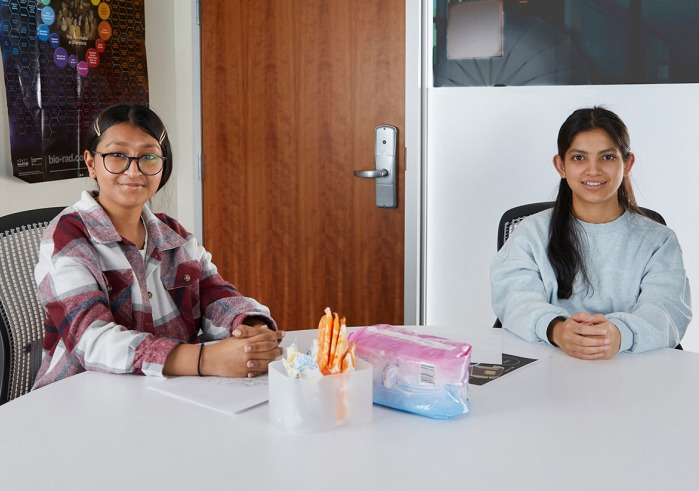Impactathon: Inspiring Social Change Through Sustainable Business Models

As a young woman growing up in Nepal, Aakriti Adhikari ‘22 had a vague idea of her own biology. With no one around her willing to explain what the word “menstruation” meant, she was in for a terrifying experience at the age of 13. Only after Adhikari got her first period did she receive an explanation of the menstrual cycle.
Nepal’s limited sex education inspired Adhikari and two other students, Paridhi Khanduri ‘25 and Nugnandini Chhetri ‘25, to brainstorm a solution. Their project “Embracing the Red” tied for first place out of the eight projects entered in the fifth annual Impactathon. “Enjovu Paper,” submitted by Anthea Mudanye ’23, Yixin Wang ’23, and Qiankuan Yang ’23, shared first place with a plan to recycle elephant dung for eco-friendly paper.
Impactathon, a business venture competition hosted by Soka’s Bridges to Business (B2B) program, invites current SUA students and alumni to solve real social issues using business models. On the weekend of February 2-4, 2022, the groups turned their ideas into business pitches with the guidance of leaders in the social impact sector. Participants learned more about designing business models, applied their knowledge to create innovative proposals, and gained valuable experience working in teams. A panel of judges composed of experts in various industries evaluated each group after they gave short presentations on their projects.
The 2021 Impactathon award winners are as follows:
- First place ($500)
- “Enjovu Paper,” which proposed raising awareness for endangered elephants by recycling elephant dung into paper products.
- “Embracing the Red,” which proposed period products and information to provide menstrual awareness and education to students in Nepal.
- Second place ($250)
- “AhotɔHealth,” which proposed a healthcare platform for patients in Ghana to streamline access to physicians and other healthcare services.
- “Food 4 Fund,” which proposed a mobile application for rescuing food loss from restaurants.
- Team Most Ready ($250)
- “Savvy Govvy,” which proposed software to help Vietnamese citizens book appointments with government offices and track their documents.
- People’s Choice ($250)
- “Enjovu Paper”
The “Embracing the Red” team’s method of raising awareness for menstrual education was the Me-Box, marketed as an educational tool offering an enjoyable and effective way for Nepali students to teach themselves about this physiological process.
Highlights of the Me-Box include period products, which include sanitary pads, tampons, and menstrual cups; games such as uterus puzzles and vocabulary flashcards; and informative pamphlets on the menstrual cycle. Designed to be environmentally friendly, the Me-Box would be made out of sustainable products such as cardboard.
“With this Me-Box, the students will not only get informed about how to use all sanitary products [and] know the workings of a menstrual cycle by playing games,” said Khanduri, “but they will generally be educated and ready for their period. Or their mother’s period. Or their sister’s period.”
Adhikari, Khanduri, and Chhetri displayed an incredible amount of passion for fighting menstrual stigma in Nepal. Considered a taboo subject in the country, they acknowledged it would not be an easy task to distribute the boxes to the schools. However, faced with this reality, they were not discouraged.
“As someone who never had any knowledge of business, it is wonderful how B2B lets anyone aboard as long as they are willing to put in the effort,” Chhetri said. “It has provided me with an opportunity to think about how we can practically use all that we learn in our classes—compassion, courage, and solving global issues.”
“Embracing the Red” set a goal to work with the existing organizations in Nepal focused on menstrual awareness and accessibility. Adhikari, a social entrepreneur, planned to leverage their positions in the local organizations She the Kranti and Pad2Go. By cooperating with these organizations, the team hoped to identify the target market and educational institutions to sell their Me-Boxes.
Their business plan calculates a cost of $36 for one Me-Box. The plan is to target 100 schools in Nepal with three boxes per school, resulting in a start-up cost of $10,800. Funding for their enterprise would come from the previously mentioned local organizations, as well as the World Health Organization (WHO) and the United Nations Children’s Fund (UNICEF). Additionally, private schools who use Me-Boxes would be charged an annual membership fee of $45 to cover a portion of the costs.
The panel of judges expressed their admiration for the group’s dedication toward tackling the stigmatized issue.
“I love your feminism and I’m super supportive of it, as I think all of us are in this room, and just let us know how we can help you,” said Shaheen Sheik-Sadhal, one of the contest judges and the founding attorney of the corporate firm Esse Law PC.
The Me-Box idea will continue to undergo development in preparation for UC Irvine’s New Venture Competition. Khanduri and Chhetri, alongside several other Impactathon participants, will take their business proposal to UC Irvine while Adhikari studies abroad this semester.
“Most students come to the B2B Impactathon event with no background in business, but with passion and a sincere desire to tackle social issues and solve problems,” said B2B Director Mary Patrick Kavanaugh. “I’m always energized by how they quickly unearth root causes of social justice issues, determine where they can provide value, and reframe their solutions into marketable business models.
The annual Impactathon event is one of multiple skill-building and entrepreneurial pathways that Soka’s B2B program offers students. For more information, visit the B2B webpage or contact Kavanaugh at mkavanaugh@soka.edu.
–Isa Queano ’23
